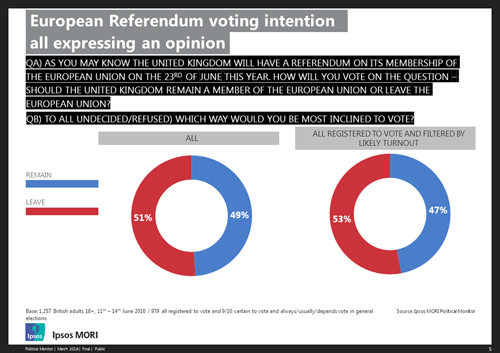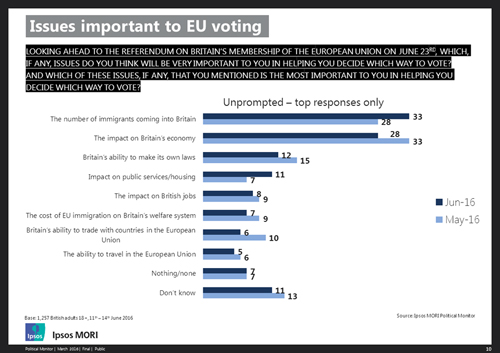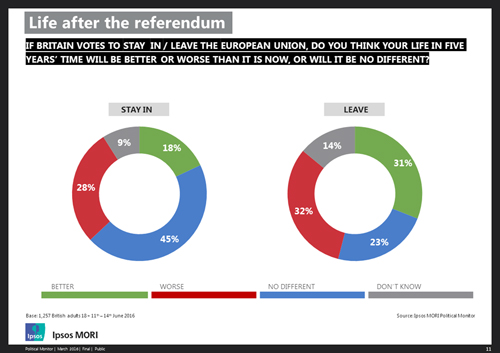Immigration is now the top issue for voters in the EU referendum
With just one week to go until the referendum on Britain’s membership of the European Union Ipsos finds Leave with a six point lead over Remain. When excluding the “don’t knows” and those not registered, and using our standard turnout filter 53% say they will vote for Britain to leave the EU while 47% say they will vote to remain (note we have introduced some methodological changes this month, see technical note for details).

As we have seen in previous months, young people are much more in favour of remaining than older people (around six in ten 18-34s would vote to remain, around six in ten of those aged 55+ would vote to leave), and social classes ABC1 are more in favour of staying in the EU than those in classes C2DE. After their move in favour of remain last month, just over a half of Conservative supporters now say they would vote to leave, as do all UKIP supporters expressing an opinion. Around two in three Labour and Liberal Democrat voters would vote to stay.
This does not mean the referendum outcome has been decided as one in five (20%) say they may change their mind (79% have definitely decided), and indeed 15% say they have changed their mind since April. When it comes to predicting the result of next Thursday’s referendum just under half (47%) believe Britain will vote to remain a member of the EU while 38% believe Britain will vote to leave. This compares with February when 62% believed Britain will vote to remain and just a quarter (26%) thought Britain would vote to leave.
Immigration has now surpassed the economy becoming the most important issue for voters. One in three (33%) mention immigration as one of their most important issues (up from 28% in May) compared with 28% saying the economy (down from 33%). There are striking differences on these two issues when looking at them by voting preference. More than half (52%) of those likely to vote to leave in the referendum mention immigration as an issue compared with 14% of those likely to vote to remain while two in five (41%) Remain voters say the economy is an important issue compared with 18% of Leave voters. Other issues mentioned by voters include Britain’s ability to make its own laws (12%), the impact on public services/housing (11%) and the impact on British jobs (8%).

The survey also asks about the direct impact the referendum result might have on people’s personal lives. If Britain votes to stay in the European Union, 18% say they would be better off in five years’ time compared with 28% who say they will be worse off, most however (45%) say it will make no difference to them at all. If Britain votes to leave the EU three in ten (31%) say they would be better off in five years’ time while one in three (32%) say they will be worse off and 23% say it will make no difference.

The poll also reveals a fair amount of distrust of the Remain and Leave campaigns amongst voters. When asked if each was mostly telling lies or mostly telling the truth just under half (46%) said politicians from both campaigns were mostly telling lies, compared with one in five (19%) thinking they are mostly telling the truth.

This distrust is also reflected in public attitudes towards a number of claims made about the outcome of a vote for Britain to stay or leave the EU.
If Britain votes to stay in the EU:
- Forty-five percent think it is true Turkey will be fast-tracked into the European Union and their population of 75 million people will have the right to free movement to the UK while another 45% say it is false.
- Nearly half (48%) think it is true that Britain would be made to pay billions of pounds in bailouts for Eurozone countries in the future compared with 40% who think it is false.
- Three in ten (28%) think it is true that there will be a higher risk of sex attacks on women by migrants compared with 62% who think this is false.
- Additionally, just under half (47%) think it is true that Britain sends £350 million a week to the European Union compared to 39% who think it is false (78% say they have heard of this statement).
If Britain leaves the EU:
- One on three (32%) think it is true that the peace and stability on our continent will be put at risk compared with three in five (59%) who think this is false.
- One in five (21%) think it is true that the stability of Northern Ireland will be put at risk compared with three in five (61%) who think it this false
- Seventeen percent think it is true that UK households will lose £4,300 per year and will be made permanently poorer compared with seven in ten (70%) who think it is false.
Our ongoing vote intention figures show the Conservatives still holding a small lead over Labour. The Conservatives currently stand at 35% compared to Labour with 34%, the Liberal Democrats at 9% and UKIP at 10%. Gideon Skinner, Head of Political Research at Ipsos, said:
“The Leave campaign is getting their messages across, especially on the key public concern on immigration. But the Remain camp is finding it much harder to convince people that their core economic messages, both on the risks of Brexit and the benefits of staying, is going to have a personal impact on their lives. Meanwhile, the public still thinks Remain is more likely to win on June 23rd – but they are much less certain than they were a few months ago.”
Downloads
Ipsos interviewed a representative sample of 1,257 adults aged 18+ across Great Britain. Interviews were conducted by telephone 11th – 14th June 2016. As announced last week, this month we have introduced some methodological changes, some as a result of internal testing, and some in line with our standard practice in the run-up to an election, including setting educational attainment quotas and weights, and basing voting figures on all registered and with our standard turnout filter. This gives us our figures of 47% remain / 53% leave this month (when excluding don’t knows). When all of these are applied to our May poll for comparison, we would have found 57% remain / 43% leave (compared with 60% remain/40% leave which was published, based on all).
The impact of the registration and turnout filters on the June poll both reduce the remain share, and increase the leave share, by one percentage point each (in other words, each increases leave’s lead by two points). We cannot show the impact of the education attainment change to the June figures, as it has been applied as a quota at the beginning of fieldwork to maximise sample efficiency rather than simply relying on weighting. However we can estimate the effect it would have had in May – and again, that month it would have reduced the remain share by one and increased the leave share by one. See here for more information.



